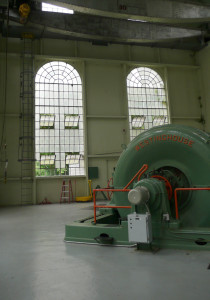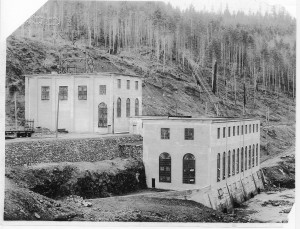Restore Oregon today filed an extensive brief with the Land Use Board of Appeals (LUBA) that could significantly advance the preservation of historic buildings that are today deteriorating in farm and forest lands across Oregon. Anticipated to be precedent-setting for the rehabilitation of some of the state’s most challenging historic resources, the case in question asks the court to endorse a plan to reuse the vacant Bull Run Power Plant, an iconic Landmark that will succumb to demolition-by-neglect if a zoning accommodation is not provided.

by-neglect unless a court rules in favor of
allowing adaptive reuse.
The case, King v. Clackamas County, specifically concerns a local government’s ability to allow selective adaptive reuse of historic resources in large swaths of the state that are zoned for exclusive farm and forest uses. Because schools, granges, churches, and other purpose-built buildings cannot easily be adapted to agricultural or timber uses, Restore Oregon is asking the court to uphold the notion that historic buildings must be provided reasonable use flexibility if they are to survive into the future.
Restore Oregon’s 30-page brief states: “To conclude that historically designated resources may never be granted an exception to allow for adaptive reuse would remove one of the few tools local governments, historic preservation protection groups and property owners have to save select, yet significant, historic resources. Such a result would impose a significant blow to historic preservation in Oregon.”
King v. Clackamas County is the second preservation court case that Restore Oregon has tackled in 2015. Earlier this year, we joined with the Lake Oswego Preservation Society in petitioning the State Supreme Court to uphold 3,200 local historic designations that have come under threat of delisting. While that decision won’t be issued until early next year, it marks the first time that the highest court in the state has considered a historic preservation issue.

LUBA’s decision in the King case will also have far-reaching implications that are likely to affect government decisions about the preservation of privately-owned historic building for years to come. Between the two cases, 2015 is likely to be remembered as a banner year for preservation law in Oregon. Restore Oregon is accepting donations in support of these and future legal initiatives.
Oral arguments will be heard in Salem at 9am on August 20. While public testimony will not be invited, the proceedings are open to all to observe.


One Reply to “Restore Oregon Asks Court to Save Historic Power Plant, Set Precedent for Adaptive Reuse Projects”
Comments are closed.